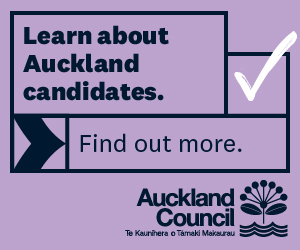
Auckland Council

Environment and biodiversity
Protecting the environment and managing natural resources is a key responsibility of regional councils. Regional councils are often also involved in pest control and resource management.

Environment and biodiversity
Protecting the environment and managing natural resources is a key responsibility of regional councils. Regional councils are often also involved in pest control and resource management.
Ensure public money spent on pest management delivers tangible results. Ensure ongoing funding to maintain pest management gains.
Establish a commercial waste to energy incinerator plant to eliminate waste to landfill.
Reduce transport pollution by de-centralising Auckland Council and re-establishing local council service centres to serve people locally.
Notice board created on council website for the ward and suburbs. To include activity, reports and voter feedback on council performance.
Discuss/meet with local boards to resolve issues. Voters are dissatisfied with public spending. Voters speak for their community.
Other issues, local community involvement. Further discussions with new mayor, councillors, local board and voters.
Ending the thousands of tonnes of raw sewage being pumped into our harbours by council render beaches un-swimmable and killing marine ecosystems.
Waste-to-energy incinerator energy recovery plants to help end landfill waste and pollution while contributing to the power grid supply.
Environment protection loans (repayable) for pollution mitigation measures rather than carbon credits that allow organisations to pay to pollute.
Commit to making sure the laws on our biodiversity and pest management are robust and fit for purpose.
Commit to working with central government,businesses and vulnerable communities in reducing pollution.
Commit to ensuring a better environmental response.
Support foods scraps collection for large scale composting removing organic waste from landfill reducing gas emissions and creating compost.
Increase enforcement staff to deal with growth in resource consent breaches especially sediment control and vegetation.
Increase funding for pest control in our regional parks.
Protect the Waitākere Ranges Heritage Area and advocate for more funding for pest eradication and ngahere protection.
Embark on a programme of re-forestation, with at least one large park to be a new urban forest with walking trails and urban tranquility.
Implement the Waste Minimisation Plan, encouraging zero waste initiatives and ushering in a new era of waste conservation and management.
Ensure public money spent on pest management delivers tangible results. Ensure ongoing funding to maintain pest management gains.
Establish a commercial waste to energy incinerator plant to eliminate waste to landfill.
Reduce transport pollution by de-centralising Auckland Council and re-establishing local council service centres to serve people locally.
Notice board created on council website for the ward and suburbs. To include activity, reports and voter feedback on council performance.
Discuss/meet with local boards to resolve issues. Voters are dissatisfied with public spending. Voters speak for their community.
Other issues, local community involvement. Further discussions with new mayor, councillors, local board and voters.
Ending the thousands of tonnes of raw sewage being pumped into our harbours by council render beaches un-swimmable and killing marine ecosystems.
Waste-to-energy incinerator energy recovery plants to help end landfill waste and pollution while contributing to the power grid supply.
Environment protection loans (repayable) for pollution mitigation measures rather than carbon credits that allow organisations to pay to pollute.
Commit to making sure the laws on our biodiversity and pest management are robust and fit for purpose.
Commit to working with central government,businesses and vulnerable communities in reducing pollution.
Commit to ensuring a better environmental response.
Support foods scraps collection for large scale composting removing organic waste from landfill reducing gas emissions and creating compost.
Increase enforcement staff to deal with growth in resource consent breaches especially sediment control and vegetation.
Increase funding for pest control in our regional parks.
Protect the Waitākere Ranges Heritage Area and advocate for more funding for pest eradication and ngahere protection.
Embark on a programme of re-forestation, with at least one large park to be a new urban forest with walking trails and urban tranquility.
Implement the Waste Minimisation Plan, encouraging zero waste initiatives and ushering in a new era of waste conservation and management.
Mayor
Compare the mayoral candidates in your area
Local council
Compare the candidates for your city or district council
Regional council
Compare the candidates for your regional council
Local board
Compare the candidates for your local or community board










